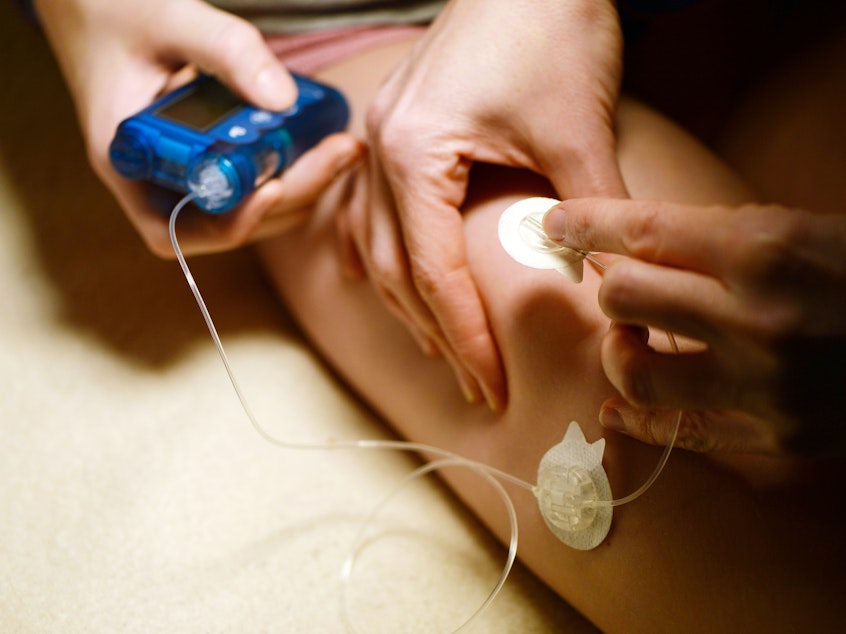Express Scripts Takes Steps To Cut Insulin's Price To Patients

As the heat turns up on drug manufacturers who determine the price of insulin and the health insurers and middlemen who determine what patients pay, one company — Cigna's Express Scripts — announced Wednesday it will take steps by the end of the year to help limit the drug's cost to consumers.
Express Scripts, which manages prescription drug insurance for more than 80 million people, is launching a "patient assurance program" that Steve Miller, Cigna's chief clinical officer, says "caps the copay for a patient at $25 a month for their insulin — no matter what."
The move by Express Scripts comes as lawmakers are focused on high drug prices and listening to stories about patients who can't afford their medication.
Insulin has become a major focus. A Minnesota man died last year, according to his mother, when he tried to ration his insulin because he couldn't afford the $1,300 monthly cost.
Though the drug has been in use for more than a century, its price in the U.S. is 10 times higher than it was 20 years ago, according to a report by the House of Representatives released last week.
Sponsored
"What we're hoping is that we're going to see more diabetics taking more insulin, [fewer] complications for those patients, and hopefully lower health care costs," Miller tells Shots.
Express Scripts covers 1.4 million people who take insulin, Miller says.
Under the discount program, patients who haven't met their deductible and normally would have to pay the full retail price for their insulin would pay $25. The same goes for those whose normal copayment is a percentage of that retail price. Miller says on average patients pay about $40 a month for insulin copayments — but the price can vary widely month to month, depending on the design of a patient's prescription drug plan.
The announcement by Express Scripts, one of the biggest pharmacy benefit managers, comes a day after a subcommittee hearing in the House of Representatives that focused on the high costs of insulin.
Patient advocate Gail DeVore testified at the hearing.
Sponsored
"Every day I get emails from people asking, 'How do I afford insulin?' " DeVore told the members of the Energy and Commerce Subcommittee on Oversight and Investigations. "Every day. And every day I have to help them find a way to find insulin."
DeVore, who has been dependent on insulin to control her diabetes for 47 years, says the full retail price for her insulin is $1,400 per month. She has good insurance, she says, so her cost for that drug is manageable. But her insurance doesn't cover a second, fast-acting insulin she sometimes needs, so she says she dilutes it to make it last longer.
A recent study by researchers at Yale found that about a quarter of people with diabetes skip doses to save money or use less of the medication than prescribed.
"Patients who rationed insulin were more likely to have poor control of their blood sugars," Dr. Kasia Lipska, an endocrinologist and assistant professor at Yale, testified at the hearing. She said patients who don't maintain good control of their blood sugar run the risk of amputations, blindness and other diabetes complications.
Lipska told the lawmakers that drug companies are raising prices for no apparent reason. She urged the committee members to focus on the list prices of the drugs that pharmaceutical companies set rather than worrying about discounts and rebates.
Sponsored
"The bottom line is that drug prices are set by drugmakers," she told lawmakers. "The list price for insulin has gone up dramatically — and that's the price that many patients pay. This is what needs to come down. It's as simple as that."
Express Scripts' program doesn't do that, Miller acknowledges.
"This is not lowering the price of the drug," Miller says. "We think there is a whole different issue, and that is, 'What's the price of pharmaceuticals in the United States?' This does not address that. This truly is addressing the pain that patients are experiencing at the counter."
Last month, Eli Lilly & Co. said it would begin selling an "authorized generic" version of one of its insulin products at half the retail price.
According to Express Scripts, its $25 copay deal will be available near the end of this year to patients who are not covered by a government insurance program (such as Medicare or Medicaid). [Copyright 2019 NPR]

